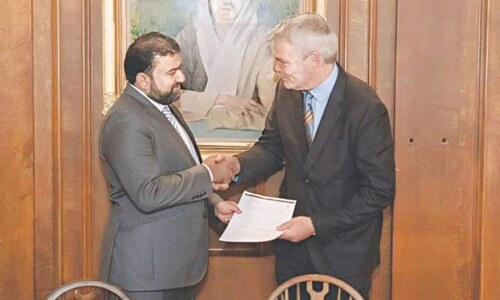PESHAWAR: Chief Justice of Pakistan Justice Iftikhar Mohammad Chaudhry on Saturday said the courts couldn’t punish people unless there was evidence to prove their guilt.
“There is an impression that the courts are acquitting culprits. However, the fact is that courts work under the Constitution and judges are bound to follow the Constitution and laws. Nobody can be punished without evidence (of unlawful activity),” he said at the certificate distribution ceremony of master trainers here at the Khyber Pakhtunkhwa Judicial Academy.
The CJP called for the building of the capacity of the officials dealing with the administration of justice by training to help them effectively counter terrorism and cyber crime.
He said the law related to cyber crime did not exist and there was a lack of professional trainers in the judicial academies.
Justice Iftikhar said the system of administering justice to the people could not move smoothly unless all stakeholders did not work in unison.
The academy was established in 2012 to impart training to the judicial officers, investigators, prosecutors and officials of other related departments.
The academy has planned to bring experts from European countries for teaching.
The CJP spent a busy day in the provincial capital.
He addressed members of the Peshawar High Court Bar Association and District Bar associations from across the province, function of the newly-enrolled advocates of the Supreme Court and inaugurated human rights directorate on the premises of the Peshawar High Court.
There were speculations among members of the bar associations that it might be last visit of the CJP to Peshawar as he’s retiring in December.
Chief Justice of the Peshawar High Court Dost Mohammad Khan along with other judges also attended these functions.
Speaking at the judicial academy, Justice Iftikhar said in the country’s judicial hierarchy, the district judiciary was the backbone of the judicial system as most litigants approached the lower courts to get their grievances redressed.
Appreciating the establishment of the human rights directorate in PHC, he said it was the prime responsibility of the state to protect fundamental rights of the citizens and judiciary could declare a law null and void if it found it in contravention with the fundamental human rights.
He said Article 199 of the Constitution empowered the judiciary to ensure protection of basic rights of the citizens.
Justice Iftikhar said the establishment of the human rights directorate in PHC was very important and of total 3,638 cases 2,980 had been disposed off only in eight months.
He said the resource-less people of Khyber Pakhtunkhwa could get benefits from the directorate.
The CJP said the directorate was also introducing E-paper facility from next month under which complaints would be received through email.
He said protection of the basic rights was responsibility of the bench and bar and justice was guaranteed our survival.
Addressing the charged gathering of lawyers in the PHC building, Justice Iftikhar said lawyers had rendered sacrifices for the supremacy of the constitution and during movement for the restoration of judiciary lawyer community had proved that would not accept any ultra-constitutional system in the country.
“You people have upheld the supremacy of the law by raising voice against injustices,” he said while recalling struggle of the lawyers during the 2007 movement for the restoration of the judiciary as bar associations played vital role in ensuring the independence of the judiciary and rule of law.
The CJP said the judiciary had successfully emerged as a true survivor and protector of constitution and fundamental rights and it had always tried to create a balance between the judicial activism and the judicial restraints.
He said the number of cases at courts had increased showing the people’s confidence in the judiciary.
Speaking on the occasion, the PHC chief justice termed over 100,000 lawyers of the country the ‘unpaid soldiers’ of the judiciary.
“Whenever there is a need, they (lawyers) will come forward again. They will even lay their lives for you (Justice Chaudhry),” he said.







































